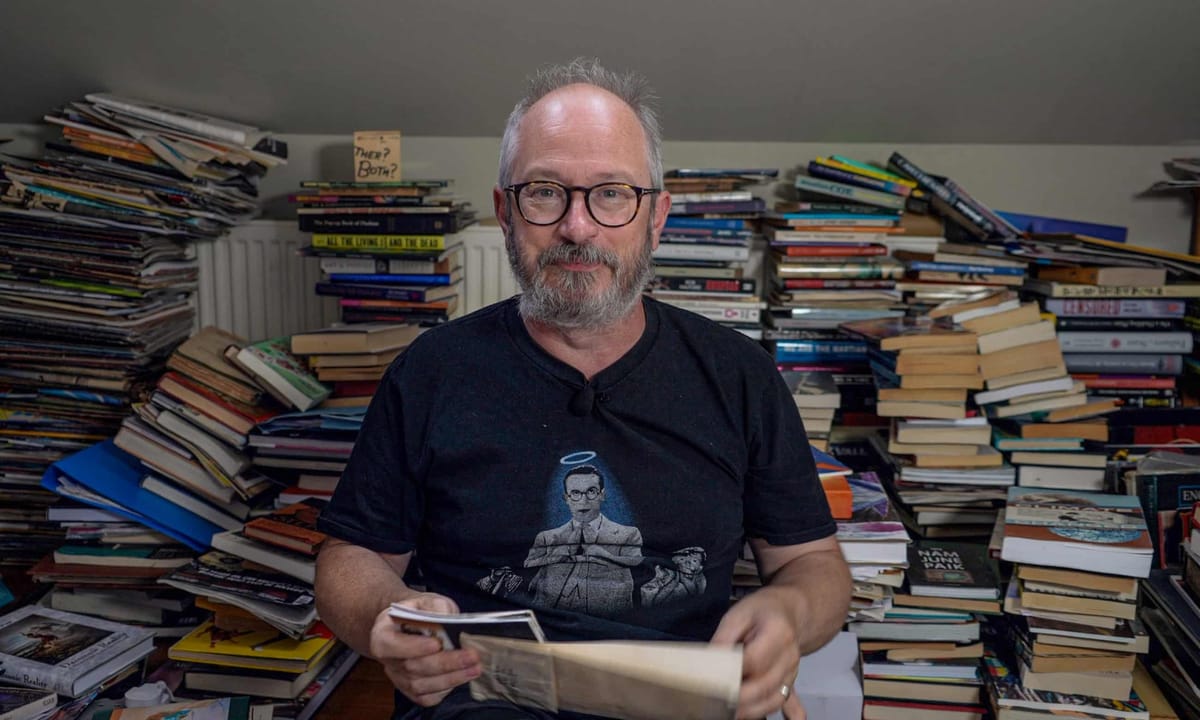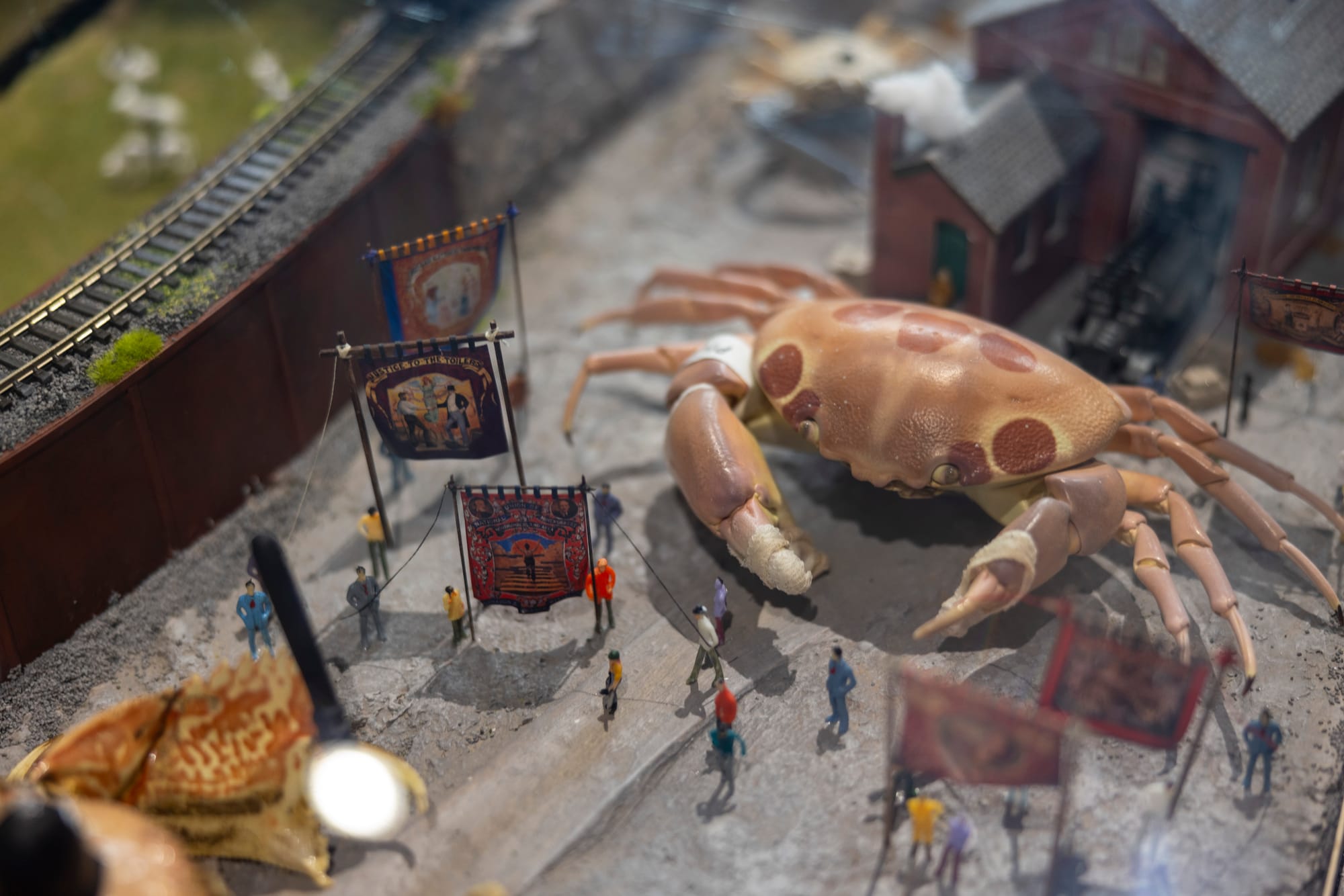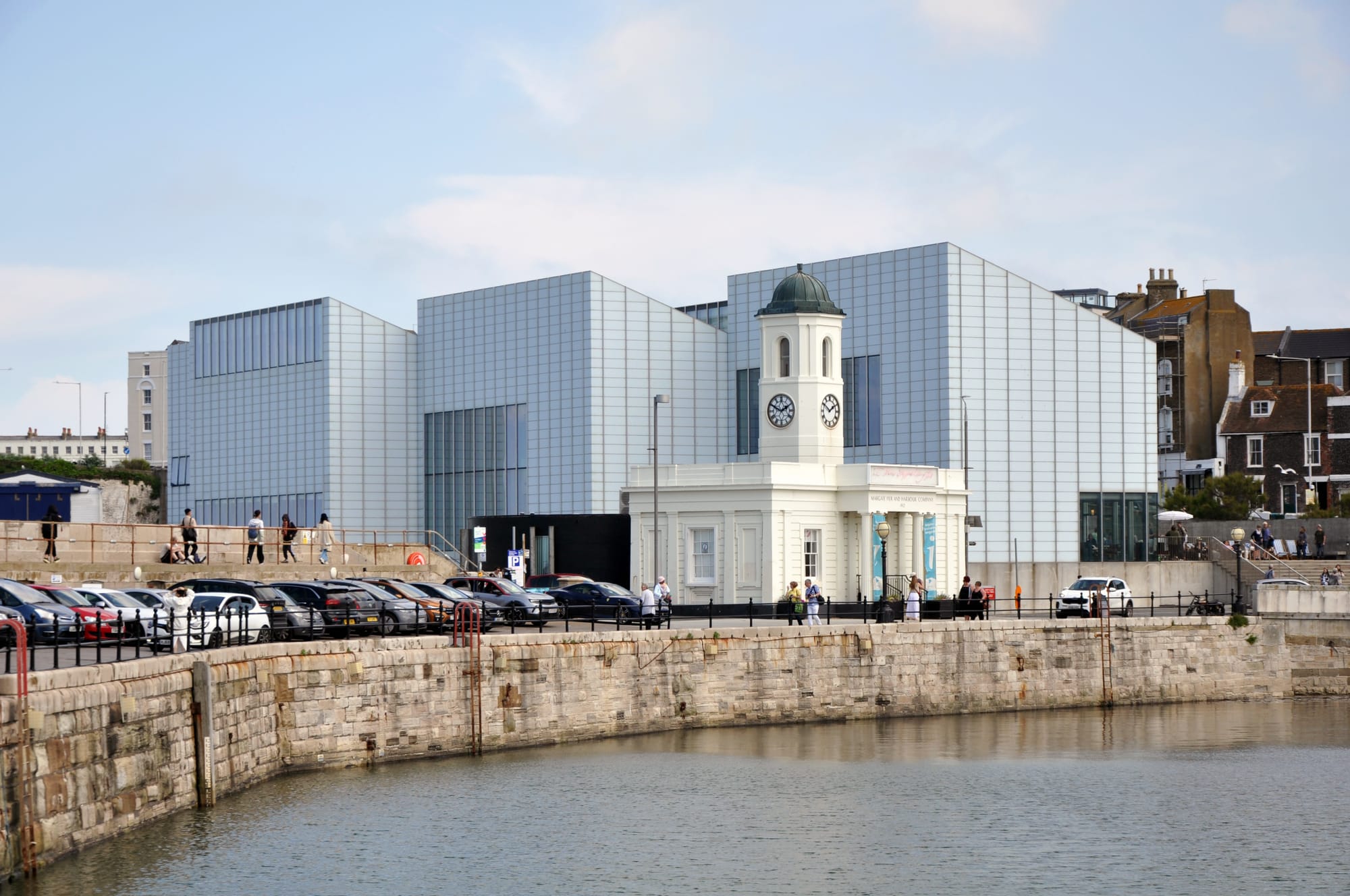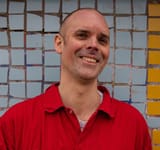Robin Ince: ‘If I see something that's interesting, I just want to go and do it’
Ahead of two performances in Margate, comedian Robin Ince discusses his love of books, mental health, poetry, and Judy Dench’s “rude handkerchief sewing”

Over Zoom Robin Ince’s face is pressed up against his laptop screen as he attempts to identify the books on the shelf behind me. While I suggest this might be difficult, as a self-professed bibliomaniac - also the title of his 2022 book - he almost immediately picks out one by film writer David Thompson. Somehow, within minutes, we’re discussing the autobiographies of Paul Daniels and Liberace.
Perhaps this is the perfect introduction to Robin. He’s probably best known as the co-host of Radio 4’s The Infinite Monkey Cage - which recently aired its 30th series - alongside physicist Brian Cox. However, as a comedic polymath, there are many ways into his work, including numerous stand up shows, podcasts and books.
Whatever way you arrive, he has an incredible ability to immediately draw you into his world and makes you feel like you’re a part of it.
He speaks quickly, often moving onto his next thought mid-sentence. In a relatively short space of time, we cover everything from his views on the comedy industry to Judy Dench’s “rude handkerchief sewing”.
Anyone who has seen him perform stand up will recognise this quick pace and propensity to veer off on wild tangents. So, while I have him on the subject of books I steer us onto the topic of his upcoming appearance at Margate Bookie, the town’s literary festival.
“I'm always reading books, so the thing that I’ll want to talk about will be whatever I've just been reading on the train,” he says. “Obviously I'll pop into the Pilgrim's Hospice charity bookshop, so the show will also be about whatever ten books I bought while I was in there on the way.”
That’s not to say he won’t arrive without anything prepared. One thing he intends to speak about, he says, is Alexis Pauline Gumbs’ book Undrowned: Black Feminist Lessons from Sea Mammals.
“That's exactly what it is - it really is black feminist lessons from sea mammals,” he enthuses. “It is a book of such incredible beauty and passion and a book that really broadens the vision of our potential of what the world can be for everyone. I've not talked about it for a while so if I'm coming to the seaside I feel that I should talk about sea mammals. And I'll save the crustaceans for when I go to the Crab Museum.”
Indeed, because Robin will be making a second trip to Margate in October, performing a show entitled The Universe and The Neurodiverse - Stories from Outer and Inner Space. Although, again, don’t expect Robin to know exactly what material he will be performing until he’s up on stage.
“I think the Crab Museum show will have more of a scientific bent than the Bookie one,” he says. “I will be talking more about the size of the cosmos and stuff like that, but then making sure that I also get into, you know, crabs and marine life.”

Robin is particularly pleased to be playing the Crab Museum, because when he last travelled to Margate, for a show at the Margate Fringe Festival in May, he arrived to find it was closed. What did not help his disappointment was then seemingly everyone he met in Margate telling him how much he’d love the Crab Museum.
As for his hopes for what he’ll find inside, he says, “I think there's two things there. One, as far as I know it has a great political agenda to it and two, I've spent a lot of my life reading out aloud from the giant killer crab novels of Guy N Smith. So it's a perfect double whammy of horror pulp fiction and progressive politics - what more could I ask for in a museum?”
Determined not to miss out a second time, he got in touch with the museum after that last trip to Margate and proposed that he perform there. This, he says, is “how I work a lot of the time. If I see something that's interesting, I just want to go and do it.”
This approach, he admits, requires an “interesting balance” in how he manages his career. “You have to work out how to make sure you've got enough money for the family and everyone to be happy,” he says. “But the moment I've done that it doesn't matter what the pay is. And so, creativity is the thing that comes first.”
For him, he says, it’s about making sure “that in this short amount of life that I've got, I get as many opportunities to find interesting situations.”
Traditionally, at this time of year, an interview with a stand up comedian would discuss how their time at the Edinburgh Fringe went. However, like an increasing number of performers, Robin did not spend a month in the Scottish capital this summer. And partly that’s down to that desire to find different places in which to perform and experiment.
“I had a great time when I did it in 2023,” he says of last year’s Edinburgh Fringe. “I think they were the best shows that I'd ever done. But it's very hard for me to work out whether I should do it anymore. I don't see as much space to play and I think that's because for so many people it costs so much money now. I think the more expensive something is, the less you feel you can experiment.”
Other than being financially restricted, there are mental health implications for this too. Robin says that this was what led him to stop performing in the main festival venues more than a decade ago. Instead, he moved his shows to the Free Fringe, where audience members pay via donations on the way out of a performance, rather than buying a ticket before they arrive.
“Everyone”, he recalls, told him that this was “a really bad career decision”. However, he adds, “everyone who said that was wrong because it totally freed me up.”
Playing the main festival venues became a huge source of stress, he says. High ticket prices at a festival where there are thousands of shows vying for people’s money leaves you “scared the whole time that you're not giving people enough. That actually stops you very often doing more interesting things which will make a better show.”

In the days after our conversation, Robin hit the headlines in the national newspapers in relation to comments that Ricky Gervais bullied him when they toured together in the early 2000s. While we don’t touch on Gervais directly, we do discuss the effect his experience of bullying and anxiety had on his ability to perform. In particular, how this led to stress that manifested in an overactive inner critic.
“I used to come off stage and I would have my fingers in my ears and I would be humming so I couldn't hear what anyone was saying as they were walking out, just in case someone hadn't liked it.”
“Even when you are doing things and they're successful, all you can find is your errors,” he continues. “You might even get a standing ovation but you will find that the memory of that face in the front row that you thought looked a bit like they weren't having a great night and you will start to obsess about that.”
That comes from a place of fear, he says, because “when you've got any kind of experience of anxiety or bullying, you're always waiting for the person who's going to say, ‘I didn't think you were very good.’ So you're arming yourself by going, I've already seen all the faults and I know that I'm shit.’”
One thing that has helped him to overcome his anxiety, he says, is a diagnosis of ADHD, which has helped to bring about a better understanding of his mental health and how his brain works.
Other creative people he speaks to often fear being diagnosed with anxiety or ADHD, he adds, concerned that addressing the root of their poor mental health will somehow detract from their creativity.
“I think it's a very dangerous thing, the myth that you need the horror to maintain the creativity,” he says. “I just don't think it is true at all.”
“From my own experience, all that changes is you create even more,” he goes on. “Because you don't lose the creative urge but you do lose that voice that goes, ‘Oh that wasn't good enough.’ I think you lose all that and [now] I'm creating three times as much.”
With his increased productivity, Robin is now experimenting with poetry, which he began writing sporadically a few years ago after wondering to himself “what have I not done on stage to embarrass myself as yet?’ In recent months writing poems has become more of a daily habit, with many of them shared in videos on social media shortly after he has written them.
“I've found that poetry is the perfect way of taking an idea and seeing what you think about it,” he says.
In the space of five months, he says, he’s written more than 200 poems, and next year will publish his first collection of poetry, Ice Cream for a Broken Tooth. So, as you would expect from Robin, his poetry arrives abundantly and rapidly. However, he’s found that it serves as a way to slow down his usual fast-paced delivery and give a bit of breathing space.
“I talk very quickly and I have a lot of ideas coming out at quite a speed,” he says. “Sometimes, especially with a full length show, I can get a sense of an audience going, ‘Oh my god, oh god, I'm having an asthma attack.’ So going into something that has order and something that I'm not allowed to deviate from - it's a moment where everyone knows that I’m kind of in control and there's a rhythm of words. So I also find it really useful for that.”
“Definitely on the Bookie show, I will do my poem about Judy Dench and the trees,” he says, recalling a discussion on a recent episode of The Infinite Monkey Cage. “In fact, I'll tell a very rude story, probably at the Crab Museum, about some of the sewing that Judy Dench used to do. Rude handkerchief sewing.
“There, if the people don't start queuing up now, when will they?”
Robin Ince will perform at Margate Bookie in the Turner Contemporary on Sunday, October 6 at 3.30pm. Tickets for that show are available here. He will then return to Margate for his show at the Crab Museum on Friday, October 25. Book tickets for that performance here.





